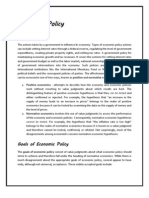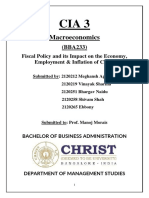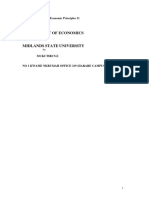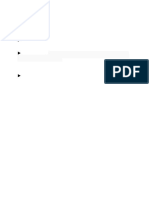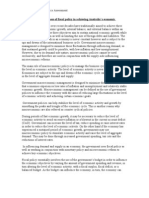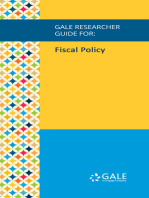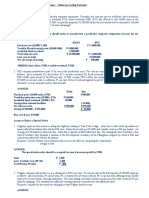Activity 1: Economic Security Refers To A Feeling of Freedom and Safety. The People of
Uploaded by
Alexis KingActivity 1: Economic Security Refers To A Feeling of Freedom and Safety. The People of
Uploaded by
Alexis KingKING, ALEXIS O.
BSA 2C
TF 10:30-12:00
ACTIVITY 1
Recall the eight goals of economics, which among these goals are made for
economic policies? Explain your answer?
Economic security refers to a feeling of freedom and safety. The people of
a country feel themselves safe no matter wherever they are in their homeland. It
is the responsibility of the government of a country to provide security of life and
belongings of their people. That is why government establishes defense including
police for the protection and security of the natives. Economic security or
financial security is the condition of having stable income or other resources to
support a standard of living now and in the foreseeable future. It includes
probable continued solvency, predictability of the future cash flow of a person or
other economic entity, such as a country and employment security or job
security. Financial security more often refers to individual and family money
management and savings. Economic security tends to include the broader effect
of a society's production levels and monetary support for non-working citizens.
For me it is the economic security that is made for economic policies.
Because economic security refers to a feeling of freedom and safety. The people
of a country feel themselves safe no matter wherever they are in their homeland.
And a good economic policy should be people-oriented. The welfare of the
people is always the primary consideration. Some former poor nations became
progressive because their policies have been focused on the improvement of the
quality of life of the masses.
ACTIVITY 2
Explain the nature of the economic policies.
Economic policy is based on economic theory or principle. It is the
applications of a theory or principle. Are formulated to attain specific objectives or
solve certain problems. Many policy makers are politicians or top government
officials who have been elected by the people.
Economic policies are as good as their makers. If the policy makers are
only after about their own personal interest, then their policies will have adverse
effects on the sector of the economy.
Comment on our own economic policies.
In our country which is the Philippines, the main program of the
government is to improve the quality of life of the people. In fact Dr. Placido
Mapa, Jr., former Minister of economic planning said:
“Man has always been the focus of all development efforts hence, the
ultimate goal of all development activities is to improve the people’s quality of life.
This brings us to a point that of haring the fruits of development. And this goal
can only be achieved by pursuing national development policies for various
regions, through with the government hopes to redress income disparities
caused by growth imbalances ”
But it is not always what you said that matters. It is the output or result.
Some economic policies are not given that high level of priority. Our economic
growth has a lot to be improved. And the policy makers must focus on the
‘people-oriented’ policy. Since all of those policies are concerned primarily by the
people.
Give some features of a good economic policies. Explain one.
One of the features of a good economic policy is that it must be long
range, but flexible to a certain degree. An economic policy must be long range; it
means that it must have a wider scope in order for it to be effective. But it must
also be flexible to a certain degree. It only means that a good economic policy
can be revised or improved if ever a certain situation occur. All in all, a good
economic policy must be adaptable and its main goal should always be for the
betterment of all.
Define Monetary policy. What are the monetary goals of the Bangko Sentral na
Pilipinas?
Monetary policy is an instruments used by the BSP to ease and tighten
credit in the economy thus promote price stability and increase or reduce liquidity
in the financial system.
The primary objective of BSP’s monetary policy is to promote a low and
stable inflation conductive to a balanced and sustainable economic growth. The
adoption of inflation targeting framework for monetary policy in January 2002 is
aimed at achieving this objective.
Explain the nature of fiscal policy?
Fiscal policy is commonly looked upon as comprising those variations in
government tax and expenditure programs which are undertaken with the
express purpose of securing the goals of macro-economic policy. It is therefore
but one aspect of the system of public finance and does not include measures
which are undertaken for reasons of allocative efficiency or which reflect a
concern with the distribution of income. Since changes in tax and expenditure
policies often imply a change in the size of the national debt, variations in debt
policy are often included under the general heading of fiscal policy. Whilst we
refer briefly to the choice between taxation and debt in the financing of any given
expenditure programs, we consider debt management policy — by which we
mean changes in the composition of a given debt — to be an entirely separate
and distinct policy question and one beyond the scope of our current concern.
The debt referred to above should be understood in its commonly accepted
sense as consisting of bonds and securities issued by the government.
State the effects of fiscal policy in the economy, how are these related to
economic development?
2. economic development?
The effect of fiscal policy depends on the current state of the economy of a
specific country. Whenever the economy seems to be overheating or growing too
fast, the government may decrease spending. This will result to the decrease in the
overall demand in the economy.
Fiscal policy involves taxes. The decreasing tax tends to stimulate economic
growth. If people will pay less tax, they will have more money on hand which they
can either spend or save. If there is an increase in spending there is also an
increase in demand and so the production should also increase.
Explain how the categories of the supply-side policy may improve the inflation
rate, employment rate, economic growth and the balanced of payment of the
country.
Supply-side policy designed to increase LONG-RUN AGGREGATE
SUPPLY (LRAS), also known as the full employment level of output. It will focus
on improving the structural long term performance/competitiveness of an
economy and improve the production potential/capacity. The aims of the policies
are to positively affect the production side of the economy by improving the
institutional framework and the capacity to produce.
Employment rate Supply-side policies can contribute to reducing
structural, frictional and real wage unemployment and therefore help reduce the
natural rate of unemployment.
Economic growth Supply-side policies will increase the sustainable rate
of economic growth by increasing Long Run aggregating supply (LRAS); this
enables a higher rate of economic growth without causing inflation.
Balance of payment By making firms more productive and competitive,
they will be able to export more. This is important in light of the increased
competition from an increasingly globalised marketplace.
You might also like
- Chapter 7 Corruption and Ethics in Global Business100% (1)Chapter 7 Corruption and Ethics in Global Business23 pages
- English Level Test Upper-Intermediate B2No ratings yetEnglish Level Test Upper-Intermediate B24 pages
- Topic: Economic Policies: I. Learning ObjectivesNo ratings yetTopic: Economic Policies: I. Learning Objectives11 pages
- Philippine Monetary Policy_20241213_102048_0000No ratings yetPhilippine Monetary Policy_20241213_102048_00004 pages
- BEE (2019-20) Handout 08 (Fiscal Policy)No ratings yetBEE (2019-20) Handout 08 (Fiscal Policy)4 pages
- Fiscal Policy: Definition - Government Spending Policies That Influence Macroeconomic ConditionsNo ratings yetFiscal Policy: Definition - Government Spending Policies That Influence Macroeconomic Conditions4 pages
- End Semester Lecture 03 Pakistan EconomyNo ratings yetEnd Semester Lecture 03 Pakistan Economy10 pages
- Micro Economics: Fiscal Policy and ObjectivesNo ratings yetMicro Economics: Fiscal Policy and Objectives7 pages
- Monetary and Fiscal Policy: Faridullah HamdardNo ratings yetMonetary and Fiscal Policy: Faridullah Hamdard7 pages
- Fiscal and Monetary Policy: What Is Fiscal Policy?No ratings yetFiscal and Monetary Policy: What Is Fiscal Policy?7 pages
- ERP Core Applications: By: Alexis O. KingNo ratings yetERP Core Applications: By: Alexis O. King7 pages
- Problem 2.4.1: Name: Jolina C. Pasahol Block: B Time: 03:00 - 04:30 MT A. Cost ModelNo ratings yetProblem 2.4.1: Name: Jolina C. Pasahol Block: B Time: 03:00 - 04:30 MT A. Cost Model2 pages
- Increase in Global Competition-Due To An Increase in Global Competition LeadNo ratings yetIncrease in Global Competition-Due To An Increase in Global Competition Lead4 pages
- Name: KING, Alexis O. Course and Year: BSA 3CNo ratings yetName: KING, Alexis O. Course and Year: BSA 3C2 pages
- Accounting For Shareholders Equity KINGNo ratings yetAccounting For Shareholders Equity KING11 pages
- Key Ws - Chapter Ix-Assembling Your Opportunity Portfolio: King, Alexis O. Bsa 2CNo ratings yetKey Ws - Chapter Ix-Assembling Your Opportunity Portfolio: King, Alexis O. Bsa 2C1 page
- King, Alexis Orcio: Kawanihan NG Rentas InternasNo ratings yetKing, Alexis Orcio: Kawanihan NG Rentas Internas3 pages
- School of Education, Arts and Sciences: LiteratureNo ratings yetSchool of Education, Arts and Sciences: Literature2 pages
- Student: Alexis O. King Course and Year: BSA 2CNo ratings yetStudent: Alexis O. King Course and Year: BSA 2C3 pages
- Budget Motivation Speech For Prison ServicesNo ratings yetBudget Motivation Speech For Prison Services9 pages
- 1812 Growing Revenues Through Commercial Excellence LEK Executive InsightsNo ratings yet1812 Growing Revenues Through Commercial Excellence LEK Executive Insights5 pages
- Learning Competency: Maintenance of Finished Work Intellectual Property Rights (IPR)No ratings yetLearning Competency: Maintenance of Finished Work Intellectual Property Rights (IPR)6 pages
- Identifying Student Misconceptions of ProgrammingNo ratings yetIdentifying Student Misconceptions of Programming5 pages
- (Prepflix) Wipro NLTH Top 30 HR Round Qns & AnsNo ratings yet(Prepflix) Wipro NLTH Top 30 HR Round Qns & Ans8 pages
- Limits and Possibilities of Middle-Class Associations As Urban Collection Actions. by Lalitha Kamath & M. Vijayabaskar100% (1)Limits and Possibilities of Middle-Class Associations As Urban Collection Actions. by Lalitha Kamath & M. Vijayabaskar5 pages
- Unit 5 Language Test: VOCABULARY: PrefixesNo ratings yetUnit 5 Language Test: VOCABULARY: Prefixes2 pages
- Criminology Licensure Examination Sample Questionnaire Law Enforcement AdministrationNo ratings yetCriminology Licensure Examination Sample Questionnaire Law Enforcement Administration7 pages
- Final Assignment - Business Strategy - Blemba 62 - Syindicate 4 PDFNo ratings yetFinal Assignment - Business Strategy - Blemba 62 - Syindicate 4 PDF18 pages
- Application Fees - Ucl Master ApplicationNo ratings yetApplication Fees - Ucl Master Application2 pages
- Permanent Resident of Tripura Certificate (PRTC) : 1. Applicant's Personal Details ANo ratings yetPermanent Resident of Tripura Certificate (PRTC) : 1. Applicant's Personal Details A3 pages
- Questionaire - KRONES - Automation, Electric, ElectronicsNo ratings yetQuestionaire - KRONES - Automation, Electric, Electronics1 page
- Employment Application Form - Biyan Abi YogaNo ratings yetEmployment Application Form - Biyan Abi Yoga7 pages
- Name: - Date: - Score: - Section: - I. Multiple ChoicesNo ratings yetName: - Date: - Score: - Section: - I. Multiple Choices2 pages
- S.R. Pandian and K. Jayachandra Reddy, JJNo ratings yetS.R. Pandian and K. Jayachandra Reddy, JJ39 pages
- Chapter 7 Corruption and Ethics in Global BusinessChapter 7 Corruption and Ethics in Global Business
- Fiscal Policy: Definition - Government Spending Policies That Influence Macroeconomic ConditionsFiscal Policy: Definition - Government Spending Policies That Influence Macroeconomic Conditions
- Fiscal and Monetary Policy: What Is Fiscal Policy?Fiscal and Monetary Policy: What Is Fiscal Policy?
- Problem 2.4.1: Name: Jolina C. Pasahol Block: B Time: 03:00 - 04:30 MT A. Cost ModelProblem 2.4.1: Name: Jolina C. Pasahol Block: B Time: 03:00 - 04:30 MT A. Cost Model
- Increase in Global Competition-Due To An Increase in Global Competition LeadIncrease in Global Competition-Due To An Increase in Global Competition Lead
- Key Ws - Chapter Ix-Assembling Your Opportunity Portfolio: King, Alexis O. Bsa 2CKey Ws - Chapter Ix-Assembling Your Opportunity Portfolio: King, Alexis O. Bsa 2C
- School of Education, Arts and Sciences: LiteratureSchool of Education, Arts and Sciences: Literature
- 1812 Growing Revenues Through Commercial Excellence LEK Executive Insights1812 Growing Revenues Through Commercial Excellence LEK Executive Insights
- Learning Competency: Maintenance of Finished Work Intellectual Property Rights (IPR)Learning Competency: Maintenance of Finished Work Intellectual Property Rights (IPR)
- Limits and Possibilities of Middle-Class Associations As Urban Collection Actions. by Lalitha Kamath & M. VijayabaskarLimits and Possibilities of Middle-Class Associations As Urban Collection Actions. by Lalitha Kamath & M. Vijayabaskar
- Criminology Licensure Examination Sample Questionnaire Law Enforcement AdministrationCriminology Licensure Examination Sample Questionnaire Law Enforcement Administration
- Final Assignment - Business Strategy - Blemba 62 - Syindicate 4 PDFFinal Assignment - Business Strategy - Blemba 62 - Syindicate 4 PDF
- Permanent Resident of Tripura Certificate (PRTC) : 1. Applicant's Personal Details APermanent Resident of Tripura Certificate (PRTC) : 1. Applicant's Personal Details A
- Questionaire - KRONES - Automation, Electric, ElectronicsQuestionaire - KRONES - Automation, Electric, Electronics
- Name: - Date: - Score: - Section: - I. Multiple ChoicesName: - Date: - Score: - Section: - I. Multiple Choices






